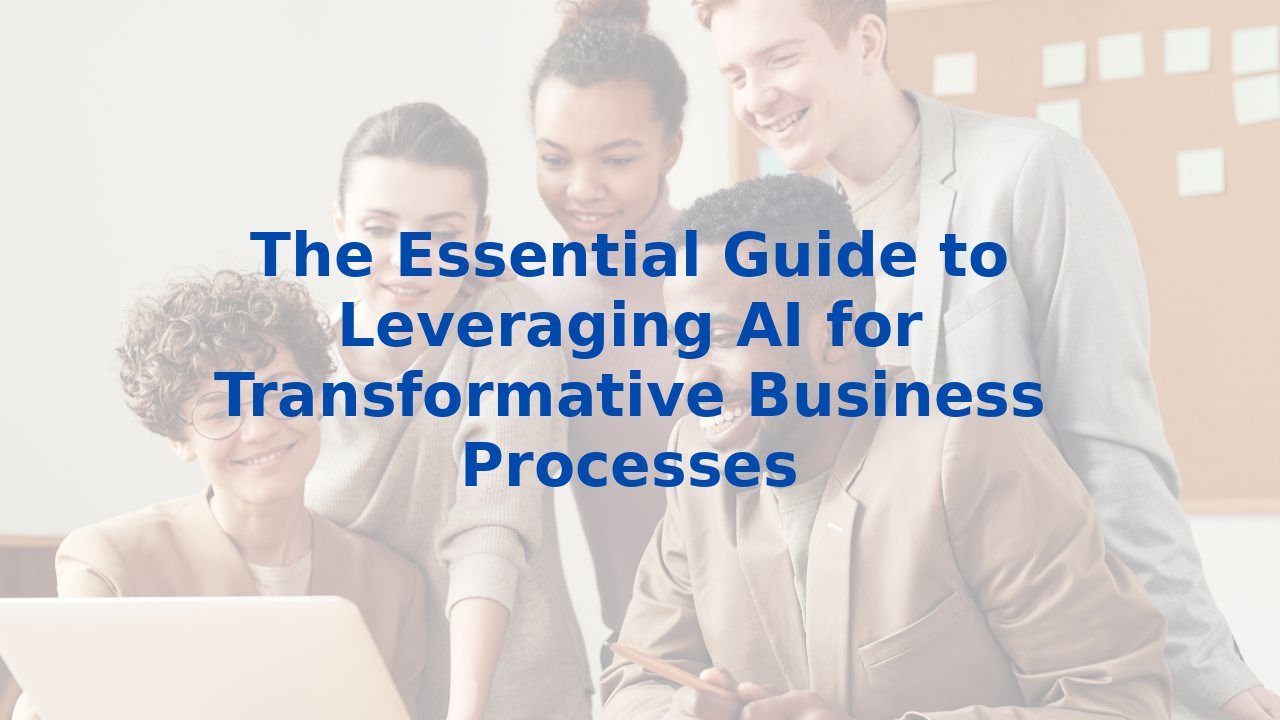The Essential Guide to Leveraging AI for Transformative Business Processes
The Essential Guide to Leveraging AI for Transformative Business Processes
In the dynamic landscape of modern business, organizations constantly seek innovative strategies to enhance performance and outpace competitors. Although technology has always played a pivotal role in business evolution, Artificial Intelligence (AI) stands out as a game-changer, offering limitless possibilities to revolutionize core processes. This guide delves into the essential business functions where AI can make a decisive impact, ultimately leading to improved efficiency within your organization.
Improving Meetings
Meetings often dominate our schedules, filled with agendas that may lead to minimal outcomes. By automating scheduling, note-taking, and summarization through AI, businesses can reclaim precious time and increase productivity. AI tools such as intelligent voice assistants can facilitate seamless appointments, while digital meeting assistants can accurately capture key highlights and create actionable notes. By minimizing the administrative burden, employees are liberated to engage more meaningfully in discussions and strategic planning.
Enhancing Sales and Marketing
Sales and marketing teams thrive on actionable insights, and AI analytics provide invaluable support in optimizing outreach. With advanced predictive models, sales teams can identify high-potential customers and prioritize interactions accordingly. Furthermore, chatbots have emerged as crucial assets, offering instantaneous customer interactions while delivering personalized experiences. These capabilities not only elevate customer engagement but also drive revenue growth by creating a robust sales pipeline.
Assessing and Improving Customer Service
AI's footprint is unmistakable in customer service, a critical element of brand loyalty and retention. Traditional automated call systems have evolved, as AI can now precisely analyze human customer service interactions. By identifying areas in need of enhancement, organizations can craft targeted training programs for their staff. Automation frees customer service representatives to tackle complex inquiries, resulting in higher levels of customer satisfaction and retention.
Improving Product Development Processes
Product development now unfolds in realms once confined to imagination. By leveraging generative design software powered by AI, businesses can efficiently explore various designs that meet specific parameters, bypassing extensive prototyping stages. The ability to quickly iterate on the final product ensures adherence to desired specifications while saving both time and resources. Innovation thrives when AI supports creativity.
Automating Content Generation
The demand for high-quality content is unyielding, and AI has risen to the occasion. Enter AI-assisted content generation tools, which can deliver thousands of lines of impactful copy in mere moments. This technology not only streamlines the content creation process but also ensures consistent branding and messaging across platforms, granting businesses a competitive edge in their communication strategies.
Enhancing the Manufacturing Process
In manufacturing, AI has sparked a new wave of collaboration between robots and humans. Collaborative robots, or cobots, are designed with advanced machine vision, enabling them to work alongside human operators safely and effectively. This synergy maximizes operational efficiency, making it feasible for smaller and medium-sized manufacturers to hold their ground against larger companies.
Refining Recruitment
Recruitment processes have traditionally been labor-intensive and time-consuming. Machine learning and AI can streamline this by automating the initial assessment of candidates, focusing efforts on those who meet established criteria. By significantly reducing the number of preliminary interviews, organizations can achieve faster hires while also ensuring they select the best-fit candidates for their roles. The quality of hires rises, and endless hours spent in preliminary assessments diminish.
The Role of AI in Business Process Management
As AI integrates into business process management (BPM), it facilitates ongoing improvement through data-driven decision-making and automation.
AI Process Discovery
AI technologies that focus on process discovery leverage data mining and natural language processing to identify inefficiencies in established workflows. By uncovering these hidden bottlenecks, organizations can make informed adjustments and optimize operations.
AI Process Mapping
Once the processes are identified, AI generates detailed process maps that visualize workflows. This clarity not only assists in documentation but provides actionable insights for optimization. Understanding how processes interlink empowers teams to address inefficiencies effectively.
AI Process Automation
The most impactful application of AI is process automation. Robotic Process Automation (RPA) orchestrated by AI can seamlessly manage repetitive tasks around the clock with unparalleled precision. By automating mundane duties, employees are encouraged to focus on strategic initiatives, nurturing innovation and growth.
Benefits of AI in Business Processes
The benefits of integrating AI into business processes extend beyond mere automation:
- Improved Efficiency: By reducing manual engagement in routine tasks, AI allows human resources to prioritize high-value activities.
- Enhanced Decision-Making: AI leverages vast amounts of data to deliver insights, fostering improved strategic choices.
- Risk Identification: AI can pinpoint anomalies and deviations in operations, empowering businesses to address potential issues proactively.
- Process Optimization: AI’s analytical prowess supports the identification of workflow patterns, optimizing operations and minimizing downtime.
Training Employees for AI
While AI is rapidly transforming business processes, the harmonious integration of this technology hinges on adequately trained employees. Ensuring your workforce is adept in AI can yield remarkable benefits:
- Adaptability: With AI training, employees can swiftly embrace emerging technologies, facilitating a smooth transition to automation.
- Collaboration: Trained employees can synergistically work alongside AI systems, merging human intuition with machine efficiency.
- Problem-Solving: Knowledgeable staff can capitalize on AI insights, tackling complex challenges and driving innovation.
Conclusion
The infusion of AI into business processes is more than a trend; it’s a pivotal shift poised to reshape how organizations function. From streamlining meetings and enhancing sales to refining recruitment and making product development agile, AI presents unparalleled opportunities for operational excellence. As AI continues to evolve, investing in employee training to adeptly leverage advanced technologies becomes imperative, ensuring long-term success in an increasingly competitive market landscape.
By understanding and embracing AI's transformative potential, businesses can unlock new pathways to effectiveness and innovation, setting the stage for sustained growth and resilience.



